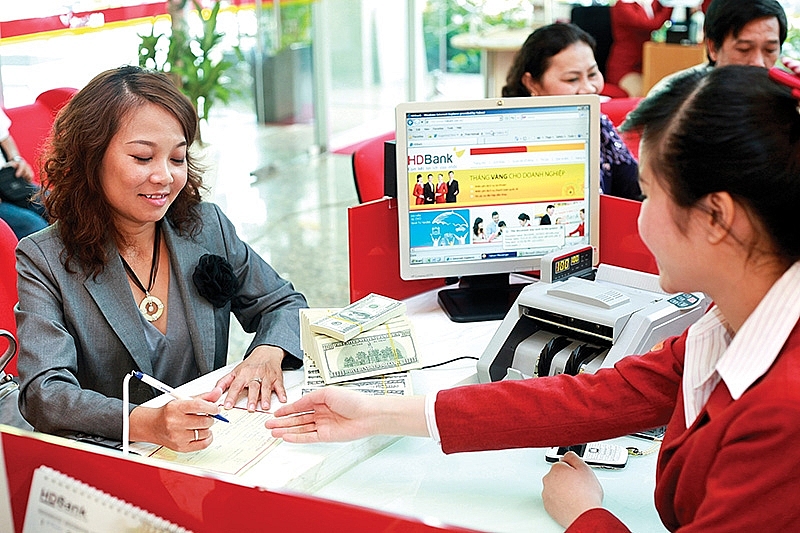Moody’s downgrade may dampen Basel II efforts
 |
| Vietnamese lenders have been working towards enacting Basel II international banking standards (photo Le Toan) |
The downrated banks include ABBank, ACB, HDBank, Vietcombank, BIDV, LienVietPostBank, Military Bank, Nam A Bank, OCB, SHB, SeABank, TPBank, Agribank, VIB, VietinBank, MSB, VPBank, and Techcombank.
Economist Can Van Luc told VIR that Moody’s decision reflects its expectation that the Vietnamese government would roll out measures to resolve its moderately high direct debt burden, and that debt affordability is expected to improve.
“But Moody’s has assessed that the Vietnamese government and other relevant institutions’ efforts are less forthcoming than expected. The banks, consequently, are affected by the review, showing that experts are sceptical of their capacity to withstand an economic downturn or market shock,” said Luc.
The Moody’s announcement stated, “Vietnam’s sovereign credit strength is a key input in Moody’s ratings for Vietnamese banks, because the country’s credit strength affects our assessment of the government’s capacity to provide support to the banks in times of stress.”
Earlier this year, Moody’s noted that most banks in Vietnam face major roadblocks in meeting Basel II standards due to the limited availability of domestic capital.
As such, many local lenders have to look for overseas investors to raise charter capital – and while whether the funds raised will be ultimately sufficient remains to be seen, fellow ratings agency Fitch expected the banking sector to be around $20 billion short of the capital required to meet Basel II, which was equal to 9 per cent of Vietnam’s GDP.
However, the banks remain silent on the matter.
State-owned VietinBank seems to be stuck in the mud in its struggle towards Basel II. While exploring several options to reshape its various pieces, the bank has ultimately failed to qualify for Basel II this year, as was the target. Additionally, the bank has maxed out its foreign ownership limit (FOL) and has not received extra capital since 2014.
According to a recent report by US investment bank J.P.Morgan, Vietnamese banks could enhance their funds by selling shares in subsidiaries. For instance, VietinBank could accumulate more capital by selling a part of its stakes in its securities, insurance, and leasing arms. Notwithstanding, Moody’s reducing of banks’ credit ratings sets it in a riskier position as foreign investors are less inclined to buy into downgraded credit unions.
Market watchdogs are cautioning that the sweeping downgrades come as unease plagues global markets, thus impeding banks’ ability to woo investors, such as OCB, HDBank, LienVietPostBank, or ACB, regardless of them qualifying for Basel II. Some lenders that are still working towards Basel II, such as ABBank, Agribank, or Nam A Bank, will likely be exposed to more volatility after this vote of no confidence.
Financiers looking to invest in state-owned lender Agribank are being urged to stay their hands after its initial public offering was postponed, adding to the list of state-owned enterprises delaying equitisation. Moody’s downgrade will be fuel for the fire, making divestment and capital mobilisation even tougher for the bank.
Moody’s downgrade highlights the continuing threat the country’s sovereign debt poses to Vietnamese banks. Although the financial health of Vietnamese banks has improved over recent years, the banking system remains the chief driver of overall event risks for the country. All downgraded banks remain dependent on wholesale money markets, increasing borrowing costs for these banks and hampering them in accessing capital.
“The lower ratings will likely raise Vietnamese banks’ borrowing costs even more,” economist Luc said. “The decision would also affect how banks raise capital and could deprive some banks of revenue. The higher costs will most likely be passed on to customers taking up loans from these banks.”
What the stars mean:
★ Poor ★ ★ Promising ★★★ Good ★★★★ Very good ★★★★★ Exceptional
Related Contents
Latest News
More News
- Private capital funds as cornerstone of IFC plans (February 20, 2026 | 14:38)
- Priorities for building credibility and momentum within Vietnamese IFCs (February 20, 2026 | 14:29)
- How Hong Kong can bridge critical financial centre gaps (February 20, 2026 | 14:22)
- All global experiences useful for Vietnam’s international financial hub (February 20, 2026 | 14:16)
- Raised ties reaffirm strategic trust (February 20, 2026 | 14:06)
- Sustained growth can translate into income gains (February 19, 2026 | 18:55)
- The vision to maintain a stable monetary policy (February 19, 2026 | 08:50)
- Banking sector faces data governance hurdles in AI transition (February 19, 2026 | 08:00)
- AI leading to shift in banking roles (February 18, 2026 | 19:54)
- Digital banking enters season of transformation (February 16, 2026 | 09:00)

 Tag:
Tag:




















 Mobile Version
Mobile Version